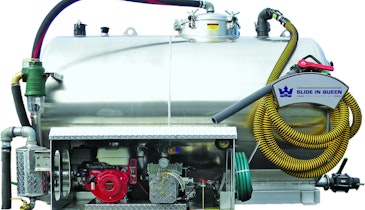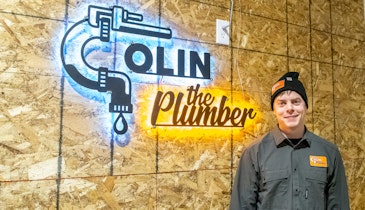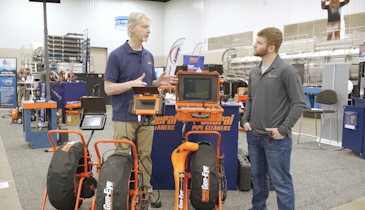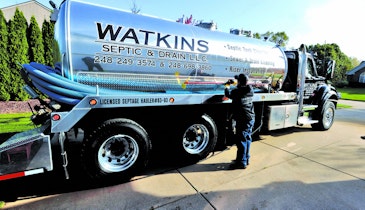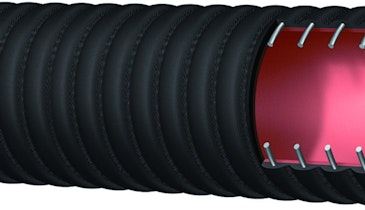When Leon Bundy founded Bundy’s Sewer and Drain in Jericho, Vt., 53 years ago, a strong back and solid work ethic were the main ingredients that built a small family business.
Today, with the help of Bundy’s granddaughter, Deanna, computer technology and more efficient business systems help overcome challenges including getting the most out of a small staff and coping with rising fuel costs.
But there’s one constant that the founding Bundy and current company leaders would tell you is key to their longevity in an uncertain business climate: personal service provided by a close-knit team.
Maintaining a reputation for superior service, continued by Leon’s son, Warren, and carried forward by daughter Deanna and her husband, Brad Fischer, has always been the goal.
When they purchased the business in 2001, Deanna and Brad Fischer faced the challenges of upgrading the office and expanding services without hiring more employees. They believe staying small enables them to keep the personal touch in service, while monitoring its quality.
“Our employees are either family or best friends, and everyone is dedicated to our customers,” says Deanna Fischer.
The success of their business strategy is often confirmed by comments. Recently, a new commercial customer said that whoever he called for references, he always heard the same response: “Bundy’s, Bundy’s, Bundy’s.” That was perfectly OK with the folks at Bundy’s.
PAPER TRAIL
Deanna Fischer was a nurse’s aide before working in a real estate office to gain experience. When she assumed the clerical business duties at Bundy’s in 2005, everything was on index cards in a well-organized filing system. “This is the way the business ran for 26 years,” says Fischer. “They never used the computers, preferring to keep the books in old-fashioned ledgers.”
Working with an IT specialist, Tony Fletcher, Fischer converted 1,800 active accounts to a Microsoft Access database. By the close of 2005, the database was operational. “We don’t enter a name until a customer calls, and there are thousands of index cards on file yet,” says Fischer. “Repeat business drives our company.”
The database also allowed Fischer to produce professional-looking invoices and efficiently mail cards reminding homeowners that it was time to have their septic tanks pumped. The latter, a new approach, was chosen because the company believed calling customers was equivalent to telemarketing. Waiting for people to call them worked because Vermont has an aggressive onsite maintenance public outreach program. Some towns even send letters reminding homeowners to pump their tanks or lift stations every three to four years.
About 18 months ago, the company upgraded its computers, allowing Fischer to change how the company advertises. Previously, they relied primarily on word-of-mouth recommendations from customers. This year, Fischer designed post cards that Idearc Media will mass mail quarterly to different areas of Vermont. The cards introduce people to the Cromaglass sequencing batch reactor that Bundy’s distributes, installs, and maintains.
Other company firsts were launching a Web site in 2006, and putting company logos on Bundy’s three Chevrolet 3/4-ton service vans. Before that, only the 1994 International with 2,000 gallon steel tank and 190-cfm Masport pump had a logo. “We also supplied the crews with company clothes,” says Fischer. The only print advertising she does is in two phone books.
Bundy’s always had 24-hour emergency service, but the calls came to Warren Bundy’s home phone, which curtailed any off-premise activities. The couple ended that situation with a 24-hour emergency paging system and cell phones. They also moved the office to their home in Jericho, and built a three-bay service garage for the vehicles.
UPDATED EQUIPMENT
In 2006, the couple bought their second pump truck, a 1997 International with 2,800-gallon steel tank and 200-gallon freshwater tank with hot water jetter. The jetter enabled the company to increase its efficiency, as frozen lines are a big issue in the northern climate. Another jetter arrived soon after for the first truck, and both have been busy ever since.
Also in 2006, the couple purchased a Tru-View camera and Tru-Tracer pipe locating system from Triple R Specialty in Jacksonville, Fla. “Three or four commercial clients asked if we did camera locating, and the price of those jobs paid for the equipment,” says Brad Fischer. “Adding jetters and camera locating have increased our commercial accounts.”
Buying the camera system was flying in the face of tradition. Warren Bundy believed experienced operators using the two, K-1500 rodder machines from RIDGID could tell if the line had a sag or a break and where it was. “He was correct,” says Brad Fischer. “The sensitivity in the cable enables my guys to locate the problem within two to three feet of its actual position.”
Within the last two years, many potential commercial and industrial customers have asked if Bundy’s was a turnkey service.
“They prefer having one company handle everything,” says Brad Fischer. “We don’t subcontract work, and that saves customers a lot of money.” Bundy’s services restaurant grease traps, schools, businesses, malls, shopping centers, developments, and condominium associations in a 50-square-mile radius covering northern Vermont. Commercial maintenance contracts account for 30 monthly service calls. Residential and commercial accounts are split 50/50.
Bundy’s has no problem disposing of septage, but grease is another matter. Most municipal plants prefer 500 gallons of grease to be diluted with 1,500 gallons of septage. Consequently, jobs are lined up so grease tanks are pumped first, followed by one or two septic tanks or lift stations. The materials then mix on the way to the treatment plant. Vermont does not allow land application of septage.
RISING COSTS
Unless there is an emergency, Deanna Fischer groups service calls by towns or around wastewater treatment plants to compensate for the price of fuel. “When the cost of fuel first went up, the prices of our competitors shot through the roof,” says Fischer. “We raised our pump-outs $5. This year, we increased the price another $5 because even with grouping, we were losing money. We don’t believe in gouging, but we do believe in making an honest profit.” For example, when pumping out neighborhoods or home associations with 10 or more tanks, Bundy’s gives discounts. If customers call and a technician can’t arrive until after 5 p.m., they are not charged overtime.
The couple believes that the business grew from the beginning because every customer was valued. “Customers tell us that we are their friends, and we feel the same about them,” says Brad Fischer. “For example, we had five calls this morning and the four of us knew where everyone lived. We didn’t have to look up the addresses.”
The four employees include Fischer, his best friend from high school, licensed journeyman electrician Mike Neil, and Shawn Roberts, who started in 1993 and has become part of the family. Todd Fischer, an identical twin brother who joined Bundy’s in 2001, is responsible for onsite installations. Last year, Deanna Fischer’s best high school friend, Bobbie Agan, arrived to handle scheduling, answer phones, proofread, and eventually take over many of Fischer’s duties, enabling her to focus on marketing.
To show appreciation for the staff’s efforts, Deanna Fischer brings pizza and soda to the men working late, and lunch if they’re on a critical job.
“I learned long ago that a thank you, or a note on their checks saying they did a great job, or a gift certificate to a favorite restaurant goes a long way in expressing how much we value them,” she says. “Family must be number one to keep quality employees.”
Besides sick time, vacation, and health insurance benefits, the couple is looking into offering a retirement plan in 2009.
One business objective is to grow the company slowly so employees remain happy in their work. “It’s knowing what we can handle and not putting ourselves in a bind,” says Brad Fischer. “We want to maintain our flexible schedule, because that enables family to always come first.”
The second business objective is enabling the men to retire. “My dad created an awesome reputation for the Bundy name, but he worked here until the day he died,” says Deanna Fischer. “Brad and I want to see us and the other couples spend those retirement years together. Future business decisions will be made based on that goal.”
